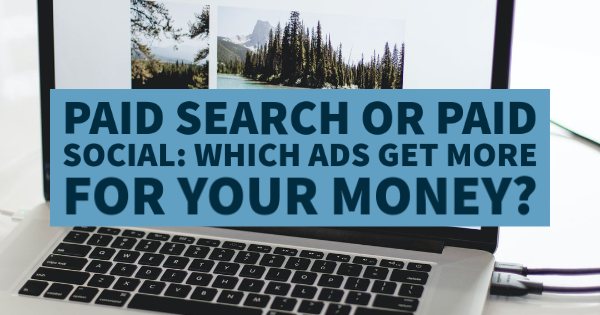Although search engine optimization plays an important role in any digital marketing strategy, organic traffic represents only a portion of what you’ll need to succeed in your industry. It’s certainly true that 93% of online experiences begin with a search engine — but that’s not true of every experience, and it’s critical to remember that PPC marketing tactics also show up in search engine results.
Paid advertisements may also be part of the online lead generation services you use to drive traffic to your site. But when it comes to developing a paid ad campaign, you’ll have an important choice to make: will you use Google PPC ads or will you rely on social media advertisements to reach your target audience? While many organizations use a combination of both, it’s essential to understand which option will be the best use of your marketing budget.
What’s the Difference Between Paid Search and Paid Social?
First, let’s briefly discuss how PPC marketing and social media ads differ. PPC marketing, also known as paid search, involves the process of targeting certain keywords for which your ads will show up. Those ads show up as links (meaning they’re made up of only text) at the top of a given search engine results page. When those ads are clicked, you’ll pay the search engine (Google, in this case) a fee. This can drive traffic directly to your website — and, if you target the right demographics and search terms, that traffic can easily convert. Although PPC ads are often mistaken as normal search results, they can also easily be skipped by those who know how to recognize paid ad disclosures.
Social media ads, on the other hand, show up on popular platforms like Facebook, Twitter, Instagram, and others as promotions. They usually include photos and/or video content promoting a certain product or service. Unlike PPC marketing, which allows you to target a specific keyword when developing an ad campaign, social media advertising allows you to target user demographics based on gender, age, and interests. You can essentially use the information gathered by these platforms to find users who might be interested in what you have to offer. Users can also like and comment on social media ads, which can provide greater insight into the users you’re targeting and whether your ads are resonating. If your targeting hits the mark, these ads also are seen as a bit less intrusive than other kinds of paid advertisements because they’ll more clearly align with your audience’s interests.
Which is Better: PPC Marketing or Social Ads?
Ultimately, both of these paid advertising options have clear benefits — and a few drawbacks. Paid social ads can be ideal for targeting impulse buyers, as these ads come with a sense of urgency and can introduce users to brands they never knew existed. The random nature of these ads, combined with the ability to target based on social media likes and interests, can be extremely powerful in terms of buyer psychology. If your product naturally falls into certain niches, it might make a lot of sense to focus on social media ads. Likewise, if you’re looking to target a younger demographic, it’s often smart to run a paid social campaign.
However, PPC marketing tends to be a better way to target users who already know what they want. Because you can choose specific keywords for your ad campaigns, they’ll often be more relevant in terms of buyer intent. Whether a consumer is conducting some initial research or they’re ready to move onto the comparison shopping phase, PPC can help them find what they’re already looking for. Something else worth noting is that, depending on your industry, the ROI for PPC tends to be higher than what you’ll find with social media ads.
Ultimately, the choice here is up to you. But if you’re struggling to find success with your SEO and PPC management, you’ll want to work with an agency that can help you make the right decisions for your business. To get started, please contact us today.

